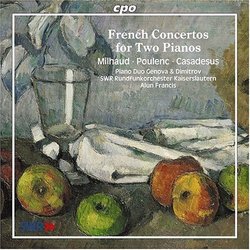These Will Lift Anyone's Spirits
J Scott Morrison | Middlebury VT, USA | 12/08/2004
(5 out of 5 stars)
"What a wonderful idea someone at cpo had--to record the three most famous French concertos for two pianos and orchestra, those of Poulenc, Milhaud and Robert Casadesus. I'm almost certain these three works have never appeared together before, although each has been recorded separately. The three works share a sensibility that is unmistakably twentieth-century French. But they also have stylistic differences that are immediately apparent. The 1932 Poulenc concerto has a brash wit that is unique to him, but it also shows a side of him that helps, these days, to make him one of France's most popular composers (and, I'm old enough to remember when Poulenc was considered a complete lightweight) and that's the middle movement, one of almost childlike, even Mozartean, simplicity that has the ability to tug at one's emotions. The outer movements are classically designed but impart a spirit of the boulevardier that mark them out as Poulenc at his naughtiest. I wouldn't want to give up my old LP of Poulenc and his longtime friend, Pierre Dervaux, playing this concerto, with Georges Prêtre conducting (which I believe is available as a remastered CD), but I must say that Piano Duo Genova & Dimitrov do an equally fine job and in modern sound.
Robert Casadesus is remembered, of course, primarily as a very fine pianist--indeed, he was included in the 200 CD Philips 'Great Pianists of the Twentieth Century' collection--but he was also a good composer, in a neoclassic French style. He wrote this concerto for him and his wife, Gaby, to play; they premièred it in Warsaw in 1934 and they recorded it later. I knew and loved that recording but I don't think it has ever made it to CD. The work is in Casadesus's fairly easily recognizable style that features fluid jeu des perles fingerwork and modal harmonies. There are many lightning fast scalar passages for the pianists in tight thirds and sixths that make one gasp, in this recording, at the almost inhuman synchronization required. The second movement, almost Ravelian in its reticence, features a rocking motion and an oh-so-French oboe solo (and the SWR Rundfunk Orchestra's principal oboist manages to sound like a French player here). The finale has a dance-inflected ostinato that underpins intentionally awkward-sounding presto figures in fourths for the pianists. The harmonies give the piece an ancient feel while still imparting a twentieth-century impatience. All done with admirable wit.
For me, the most endearing of these concerti (much as I love the other two) is the Milhaud. It has been widely recorded and is occasionally heard in concert. Well known duos like the Contiguglia brothers and the Labecque sisters have played it widely. My favorite recording up to now has been that of James Anagnoson and Leslie Kinton on the CBC label. But this performance trumps them, I believe. First, there are the marvelously tuned and regulated pianos; the recorded sound is fabulous. Then there is the hair-trigger accompaniment provided by Alun Francis and his radio orchestra from Kaiserslauten. There isn't anything I don't like about this performance. But especially I respond to the extra pizzazz given Milhaud's trademarked excursions into Brazilian rhythms--thank goodness for that trip he took to Brazil with Paul Claudel in 1918--and I expect you, like I, may be making like Carmen Miranda during those passages. There are also some harmonies I'd swear Milhaud stole from Gershwin; well maybe they were simply in the air and after all he had written the jazzy 'Le Création du Monde' and 'La Boeuf sur le Toit' twenty years earlier. The second movement, which is a good deal more serious, even melancholy, has always moved me. I am intrigued by the booklet writer's speculation that it reflects Milhaud's feelings of being confined to a wheelchair by his arthritis. Whatever the facts, it does convey a kind of heavy sadness that I respond to, and yet I'm always able afterwards to feel the urge to leap out of my chair and dance to the third movements whirlwind rhythms.
Piano Duo Genova & Dimitrov is a team I'd not encountered before. They are Aglika Genova and Liuben Dimitrov and apparently came together in Hanover in 1995. A look on the Internet tells me they have made a number of other recordings before this one. They certainly have the goods.
Recommended. As I said in the title of this review, these performances will lift your spirits.
TT:54'14
Scott Morrison"

